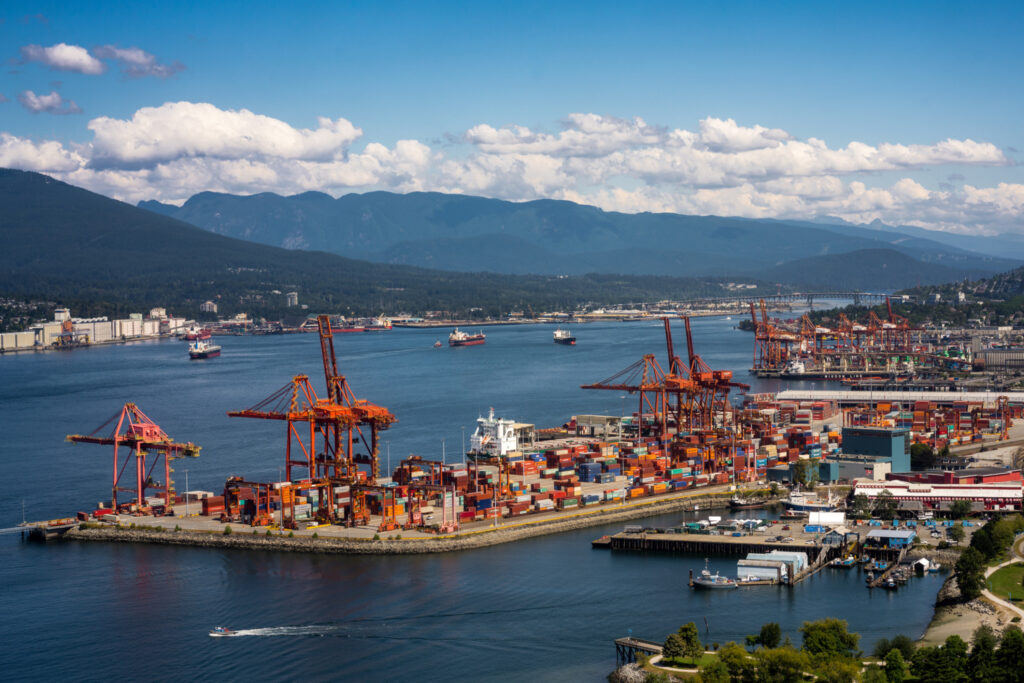Trucking work slows as B.C. ports strike continues
Drayage carriers serving B.C. ports are beginning to run out of work as a strike by longshore workers continues.
Operations have been shuttered at the ports of Vancouver and Prince Rupert for more than 17 consecutive shifts. And the British Columbia Trucking Association (BCTA) confirms all container moves in and out of the ports have stopped.
While limited “off dock” moves and work that can be done without accessing ports are completed, that work is “pretty slim” and diminishing, says BCTA president Dave Earle, stressing that the association does not comment on labor negotiations themselves. “By and large, fleets and owner-operators are parked and won’t be working until the dispute resolves.”

Tom Johnson, general manager of Vancouver-based Kimberly Transport, agrees.
“I’d say that at least 80% of our port drivers have pretty much, you know, they’ve run out of work. So, we are rotating drivers being off,” he told TruckNews.com. “I do feel for the drivers that are continuing to be laid off, even prior to the strike. But more so with this strike.”
Layoffs in related industries
In a July 6 statement, the British Columbia Maritime Employers Association (BCMEA) said it has learned of layoffs in “related industries”, as well as cargo diversions and economic impacts. The association estimates $4.6 billion in cargo has potentially been disrupted so far.
“It is taking its toll on all businesses, I think just in the community in general, in Vancouver,” Johnson added. “There’s a vast amount of trucks that are parked, port-related and unrelated. I have to say again, this is like no other time.”
Post-pandemic, many companies took on extra warehousing space to facilitate the high volume of transloading that was taking place. Now those warehouses are “almost empty”, but the expensive land leases still have to be paid, he explained.
“I wouldn’t even begin to speculate how much trouble they’re in… Freight rates on the highway are at an all-time low. You know, the strike is just an accelerant for some transport companies’ race to the bottom. There’s definitely not enough freight going around right now to keep all the carriers moving.”
Meanwhile, carriers are holding loaded containers that were supposed to be going into the port prior to the strike.
“Speaking directly for us [Kimberly Transport], we have a few pulp bookings that were loading as the job action took place. Those containers are just sitting in our yard loaded, waiting to go,” Johnson said. He added that the product is basically at a standstill, and customers are worried about the cost of diverting cargo through Seattle’s port.
“This is definitely not something that anybody wants, especially when Canada’s flirting with the idea of actually being in a full-on recession. This is not something that we need at this time.”
Business concerns
He’s not the only businessperson to raise concerns.
On July 5, BCTA and the Canadian Trucking Alliance (CTA) were among the 120 associations to sign a joint letter to Prime Minister Justin Trudeau, asking the federal government to enact back-to-work legislation to prevent further supply chain disruptions.
But the International Longshore and Warehouse Union Canada has warned Ottawa not to intervene in the negotiations process, and Johnson says people are worried because there’s no sign the government will intervene.
“No organization should be able to hold this country hostage,” he said of the union actions. “The government has the tools to get everyone back to work and continue to negotiate while keeping our economy moving. So that’s what all stakeholders expect the government to do.”
The use of third-party contractors for maintenance work has been a central issue in the job action, but ILWU Canada has also expressed concerns about port automation and the effects of inflation on the union’s workers.
While Johnson believes some of the union concerns around contracting and automation issues are reasonable, he said there could be more transparency when it comes to wage-related issues.
“I think everybody is no doubt getting frustrated with the current situation,” he added.
Have your say
This is a moderated forum. Comments will no longer be published unless they are accompanied by a first and last name and a verifiable email address. (Today's Trucking will not publish or share the email address.) Profane language and content deemed to be libelous, racist, or threatening in nature will not be published under any circumstances.
Prime Minister, Justin Trudeau should stay out of the workforce business. If the government can give money away to other countries, millions and billions of dollars helping other countries out, I think it’s time the government helped out the trucking industry. The port workers deserve higher wages, trucking industry deserves higher rates. That’s why we cannot get people driving a truck anymore. It’s not worth it. Prime Minister, Justin Trudeau needs to go. I hope the next election we are done with his stupidity. He’s all talk and not looking after his own country. Thank you.